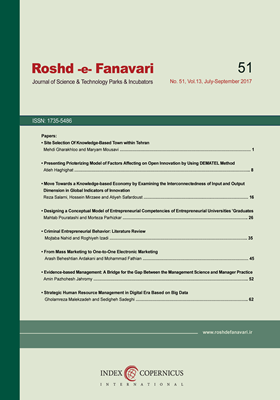Criminal Entrepreneurial Behavior: Literature Review
Subject Areas : كارآفريني و مديريت شركتهاي دانش بنيان
Mojtaba Nahid
1
![]() ,
Roghayeh izadi
2
,
Roghayeh izadi
2
1 -
2 -
Keywords: Entrepreneurs Criminal Business Organised Crime Criminal Organization Crime Strategy Illegal Market,
Abstract :
Entrepreneurs play an important role in the economy in order to identify opportunities and to exploit their economic and social needs of the production process and purse market driving. While entrepreneurship is normally researched as something positive, this paper illustrates the dark sides of the construct. This conceptual research paper applies entrepreneurship literature to generate new insights into entrepreneurship in organized crime and entrepreneurs in criminal organizations. Criminal entrepreneurship is found in organized crime, where criminal entrepreneurs choose to organize a criminal business enterprise in order to exploit illegal market opportunities. Entrepreneurial opportunities can be exploited in a variety of ways, depending on strategy and available resources. As organised crime is growing locally as well as globally, law enforcement agencies need to develop their understanding of strategic criminal entrepreneurship. Based on perspectives in this paper, the dark side of Entrepreneurship needs to be further explored within both the legitimate and illegitimate business sector in the local as well as global perspective in future research.
1- مطهري، مرتضي.. «كليات علوم اسلامي: منطق- اسلامي»، تهران: انتشارات صدرا، 1386.
2- محمدی الیاسی، قنبر. «موضوع كارآفريني بهعنوان يك حوزه علمي»، فصلنامه توسعه كارآفريني، سال اول، شماره اول، 1387.
3- ناهید، مجتبی؛ زالی، محمدرضا. «بررسي تئوريك رابطه سرمايه اجتماعي و كارآفريني»، اولين كنفرانس بینالمللی مديريت و نوآوري، شیراز، 1389.
4- بی ملور، رابرت؛ كالتون، گری ... [و دیگران]. «کارآفرینی برای همه (کتاب درسی برای دانشجویان)» (ترجمه جهانگیر یداللهی فارسی، كورش نجفی)، تهران: دانشگاه تهران، مؤسسه انتشارات، 1391.
5- یداللهی فارسی، جهانگیر؛ گلابی، امیرمحمد؛ مهرابی، رزا. «فرصتها و ایدههای کارآفرینی: تحلیل و ارزیابی محیطی»، تهران: انتشارات: سازمان انتشارات جهاد دانشگاهی، 1390.
6- Beaver, G. and Jennings, P. ‘Competitive advantage and entrepreneurial power – the dark side of entrepreneurship’, Journal of Small Business and Enterprise Development, Vol. 12, No. 1, pp. 9–23, 2005.
7- Williams, C.C. ‘The undeclared sector, self-employment and public policy’, International Journal of Entrepreneurial Behaviour and Research, Vol. 11, No. 4, pp. 244–257, 2005.
8- Shane, S, & Venkataraman, S., "The promise of entrepreneurship as a field of research", The Academy of Management Review, 25 (1), PP: 217-226, 2000.
9- Davidsson, P. Wiklund, J. "Levels of analysis in entrepreneurship research: Current research practice and suggestions for the future". Entrepreneurship Theory & Practice 25 (Summer): 81-100, 2001.
10- Davidsson, P. Honig, B. "The role of social and human capital among nascent Entrepreneurs". Journal of Business Venturing. 18 (3), 301–331, 2003.
11- Jayasinghe, K. Thomas, D. and Wickramasinghe, D. ‘Bounded emotionality in entrepreneurship: an alternative framework’, International Journal of Entrepreneurial Behaviour and Research, Vol. 14, No. 4, pp.242–258, 2008.
12- Von Lampe, K. ‘Criminals are not alone. Some observations on the social microcosm of illegal entrepreneurs’, in Duyne, P. van, Majevic, C. Dijck, A. von Lampe, M. and Harvey, J. (Eds.): Crime Business and Crime Money in Europe. The Dirty Linen of Illegal Enterprise, pp. 131–156, Wolf Legal Publishers, Nijmegen, The Netherlands, 2007.
13- Lyman, M.D. and Potter, G.W. Organized Crime, 4th ed. Pearson Prentice Hall, Upper Saddle River, New Jersey, 2007.
14- Abadinsky, H. Organized Crime, 8th ed. Belmont, CA, Thomson Wadsworth, 2007.
15- Kenney, M. ‘The architecture of drug trafficking: network forms of organisation in the Colombian cocaine trade’, Global Crime, Vol. 8, No. 3, pp.233–259, 2007.
16- Smith, M. ‘‘Real’ managerial differences between family and non-family firms’, International Journal of Entrepreneurial Behaviour and Research, Vol. 13, No. 5, pp.278–295, 2007.
17- Levi, M. ‘Organized crime and terrorism’, in Maguire, M. Morgan, R. and Reiner, R. (Eds.): The Oxford Handbook of Criminology, Oxford University Press, Oxford, UK, 2007.
18- Duyne, P.C.V. Lampe, K.V. and Newell, J. "Criminal Finances and Organizing Crime in Europe", Wolf Legal Publishers, Nijmegen, 2003.
19- Wright, A. Organised Crime, Willan Publishing, Devon, UK, 2006.
20- Woodiwiss, M. Organized crime and American power, University of Toronto Press, Toronto, Canada, 2001.
21- Elvins, M. ‘Europe’s response to transnational organised crime’, in Edwards, A. and Gill, P. (Eds.): Crime: Perspectives on Global Security, pp.29–41, Routledge, London, 2003.
22- Council of Europe ‘Crime analysis: organised crime – best practice survey no. 4’, Economic Crime Division, Department of Crime Problems, Directorate General I – Legal Affairs, Council of Europe, Strasbourg, France, 2002.
23- Pérez, N. ‘Crime networks’, Job market paper, University of Maryland, 2007.
24- Kapustkina, E.V. ‘The system of business financing in Russia: the gender aspect’, International Journal of Entrepreneurship and Small Business, Vol. 5, Nos. 3/4, pp. 297–317, 2008.
25- Kim, G.M. and Kil, E.S. ‘Architectural features of knowledge management success organizations’, International Journal of Innovation and Learning, Vol. 5, No. 6, pp. 617–632, 2008.
26- Singh, M.D. Kant, R. and Narain, R. ‘Knowledge management practices: a sectoral analysis’, International Journal of Innovation and Learning, Vol. 5, No. 6, pp. 683–710, 2008.
27- Endres, A.M. and Woods, C.R. ‘The case for more ‘subjectivist’ research on how Entrepreneurs create opportunities’, International Journal of Entrepreneurial Behaviour and Research, Vol. 13, No. 4, pp. 222–234, 2007.
28- Small, K. and Taylor, B. ‘State and local law enforcement response to transnational crime’, Trends in Organized Crime, Vol. 10, No. 2, pp.5–17, 2006.
29- Alvarez, S.A. and Barney, J.B. ‘The entrepreneurial theory of the firm’, Journal of Management Studies, Vol. 44, No. 7, pp. 1058–1063, 2007.
30- Foss, K. Foss, N.J. Klein, P.G. and Klein, S.K. ‘The entrepreneurial organization of heterogeneous capital’, Journal of Management Studies, Vol. 44, No. 7, pp.1165–1186, 2007.
31- Gill, M. ‘The craft of robbers of cash-in-transit vans: crime facilitators and the entrepreneurial approach’, International Journal of the Sociology of Law, Vol. 29, pp.277–291, 2001.
32- Williams, C.C. The Hidden Enterprise Culture – Entrepreneurship in the Underground Economy, Edward Elgar Publishing, Cheltenham, UK, 2006.


